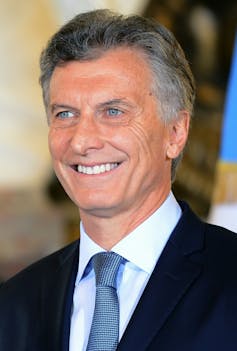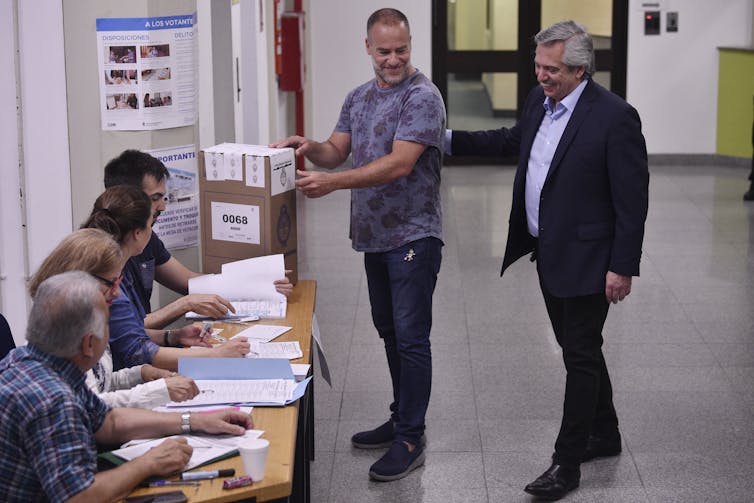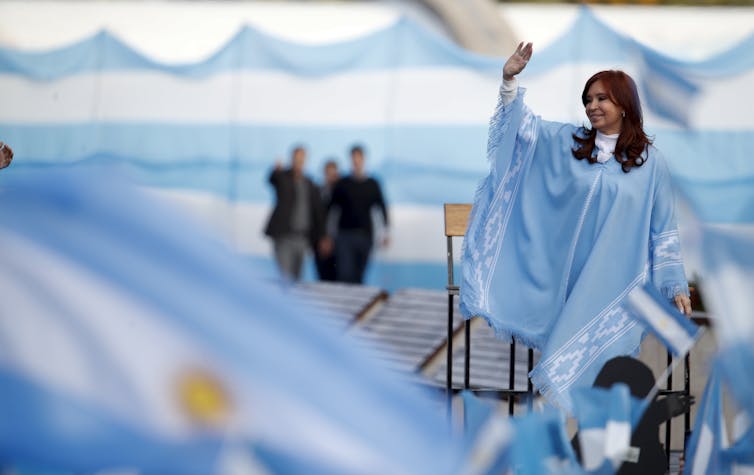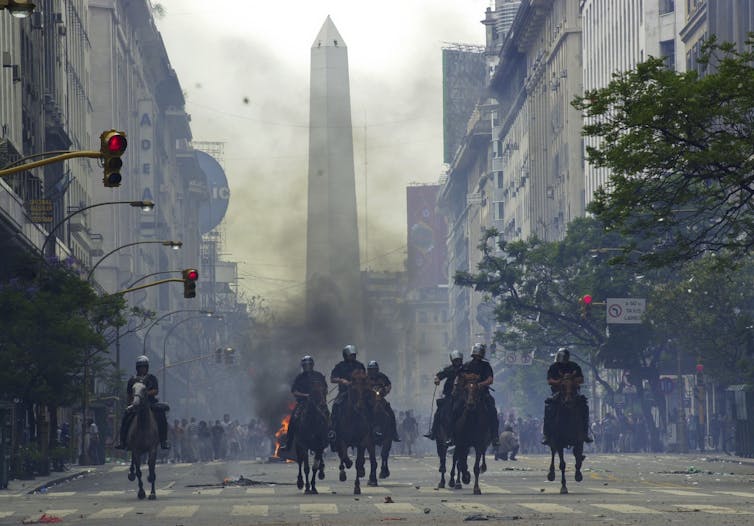Argentina elects new president on promises to fix economy and unify a struggling nation
- Written by Jennifer Pribble, Associate Professor of Political Science and Global Studies, University of Richmond
Argentina has elected Alberto Fernández of the Peronist party as its next president with 47.4% of the vote[1]. Fernández defeated incumbent Mauricio Macri and four other candidates[2] on Sunday, Oct. 27, avoiding a runoff.
Fernández and his running mate, Cristina Fernández de Kirchner – a senator, former Argentine president and former first lady – ran on a left-leaning platform, appealing to Argentines suffering from chronic economic crisis[3].
“If you want justice, solidarity, employment, public education and public health, then let’s work together to build the Argentina we all deserve,” said Fernández at his campaign’s Oct. 24 closing rally[4]
The duo heads up a broad-based new political coalition[5] that brings together distinct strands[6] of Argentina’s Peronist party. Fernández, a moderate 60-year-old lawyer, was Fernández de Kirchner’s chief of staff early in her first administration. They publicly fell out in 2008[7] over economic policy.
Setting aside past differences, they’ve promised to right Argentina’s economy and restore the country’s eroded social safety net.
Economic voting prevails
President Macri’s defeat[8] is widely seen as a response to his economic failures[9].
 Mauricio Macri.
Argentina Presidency of the Nation[10]
Mauricio Macri.
Argentina Presidency of the Nation[10]
Macri won office in 2015[11], when Argentia’s economy was struggling, promising “zero poverty[12].” Today, 35%[13] of Argentines live in poverty – up 5% since 2016[14].
Children have been hit hardest by Argentina’s recession[15], which began in 2018. Half of all Argentines under age 14 are poor[16].
The South American country has also seen record inflation – predicted to reach 53% by the year’s end[17] – and currency devaluation[18]. The Argentine peso lost more than half its worth last year and fell another 35%[19] in August 2019.
Macri, a conservative businessman, blamed his Peronist predecessors[20] for Argentina’s economic woes.
But his efforts to right the economy – which included imposing strict limits on social welfare spending[21], in compliance with an International Monetary Fund loan agreement – merely exacerbated inequality[22]. Unemployment stands at almost 11%[23].
Macri also failed[24] to adequately address the currency crisis, which further undermined the productivity of Argentina’s struggling industrial base[25].
Back to the future
President-elect Fernández has pledged to jump-start production[26] and restore social programs aimed at curbing hunger and poverty[27]. He says he will pay off Argentina’s staggering national debt, but insists that such payments will not come at the expense of the social safety net[28].
 Fernández casts his ballot, Oct. 27, 2019. Voting is compulsory in Argentina.
AP Photo/Gustavo Garello[29]
Fernández casts his ballot, Oct. 27, 2019. Voting is compulsory in Argentina.
AP Photo/Gustavo Garello[29]
Fernández hopes to give voters a “repeat performance” of 2003[30] – the year Argentina elected President Néstor Kirchner on the heels of a devastating economic crisis[31].
Defaulting on more than US$100 billion in loans, the Argentine government in late 2001 was forced to freeze bank accounts for weeks and abandon its policy of pegging the peso’s value to that of the dollar[32]. Argentines with savings saw their nest-eggs evaporate as the peso lost 66% of its value overnight[33]. Working people were plunged into poverty[34].
Kirchner, a little-known governor of the Patagonian province of Santa Cruz, proved to be a formidable politician. He renegotiated the country’s debt[35], opened trials against military officials accused of human rights violations during the dictatorship of the 1980s[36] and expanded social spending[37]. Kirchner left office in 2007 with a record 70% approval[38].
He was succeeded by his wife, Cristina Fernández de Kirchner. She continued many of his policies[39], but by the time she left office, in 2016, Argentina’s economic growth had slowed, the currency depreciated once again and inflation had edged up[40].
During the 2019 presidential campaign, Fernández largely overlooked his VP candidate’s mixed economic record, appealing to Néstor Kirchner’s 2003 comeback story and the Peronists’ legacy of empowering poor people.
Argentina’s Peronist party was founded in 1947 by Juan Domingo Perón. Along with his wife Evita, Perón transformed Argentina by incorporating its growing working class[41] and other marginalized sectors into political, economic and social life. Perón’s experiment boosted Argentina’s industrial base and expanded employment[42], but ended in political and economic crisis. In 1955, he was overthrown in a coup.
Though its ideological orientation has shifted from left to right[43] and back[44] over the decades, the Peronist party remains a central institution of Argentine politics.
Fernández de Kirchner’s long shadow
Fernández’s efforts to promote national unity were complicated by his running mate’s polarizing record.
Many Argentines remember Cristina Fernández de Kirchner’s administration as a time of excessive spending, conflict with the media and scandal[45]. Now under investigation on 12 charges of corruption[46], she played a low-key role in the campaign.
 Cristina Fernández de Kirchner is a polarizing figure in Argentina.
AP Photo/Natacha Pisarenko[47]
Cristina Fernández de Kirchner is a polarizing figure in Argentina.
AP Photo/Natacha Pisarenko[47]
However, Fernández de Kirchner’s record of social inclusion endeared her to many Argentines[48]. During two terms in office[49], she renationalized Argentina’s pension system[50], which was privatized in 1993, to protect retirees from market volatility. She also established a small stipend for low-income families[51] who ensure their children attend school and have regular health screenings.
These reforms moved Argentina’s welfare state in a more progressive direction for the first time in decades and improved income distribution, my research on inequality in Latin America shows[52]. Argentina’s current crisis would likely have been more severe[53] absent this safety net.
Fernández de Kirchner was Argentina’s first elected female president. Though the country’s feminist movement has grown substantially recently[54], a broadly popular abortion legalization bill[55] was rejected by Argentina’s senate in 2018. As a senator, Fernández de Kirchner strongly supported[56] the measure.
Uphill battle
A repeat performance of Argentina’s 2003 economic turnaround is unlikely.
President-elect Fernández, who assumes office in December, will come to power during a full-blown crisis. Fernández also faces an unfavorable international economic climate, with the trade war between the U.S. and China[57] threatening to slow consumption in two of Argentina’s top export markets.
 Mass protests followed Argentina’s 2001 economic crisis, Dec. 20, 2001.
AP Photo/Walter Astrada, File[58]
Mass protests followed Argentina’s 2001 economic crisis, Dec. 20, 2001.
AP Photo/Walter Astrada, File[58]
The last Argentine president elected under similar circumstances, Fernando de la Rua, oversaw the political and economic implosion of 2001. He was forced out of office by mass protests[59] in December 2001.
President-elect Fernández knows this history well. He was on the Buenos Aires city council when de la Rua fled the presidential palace in a helicopter[60].
Fernández has assured voters he’s ready for the uphill challenge, saying “We know what needs to be done to get Argentina back on its feet[61].”
[ You’re smart and curious about the world. So are The Conversation’s authors and editors. You can read us daily by subscribing to our newsletter[62]. ]
References
- ^ 47.4% of the vote (www.lanacion.com.ar)
- ^ incumbent Mauricio Macri and four other candidates (elpais.com)
- ^ suffering from chronic economic crisis (www.batimes.com.ar)
- ^ campaign’s Oct. 24 closing rally (www.lanacion.com.ar)
- ^ broad-based new political coalition (www.bloomberg.com)
- ^ distinct strands (www.bbc.com)
- ^ fell out in 2008 (www.euronews.com)
- ^ President Macri’s defeat (theconversation.com)
- ^ economic failures (www.bbc.com)
- ^ Argentina Presidency of the Nation (upload.wikimedia.org)
- ^ won office in 2015 (theconversation.com)
- ^ zero poverty (www.americamagazine.org)
- ^ 35% (www.indec.gob.ar)
- ^ up 5% since 2016 (www.eldia.com)
- ^ Argentina’s recession (www.focus-economics.com)
- ^ poor (www.indec.gob.ar)
- ^ 53% by the year’s end (www.reuters.com)
- ^ currency devaluation (www.latimes.com)
- ^ 35% (www.cnn.com)
- ^ his Peronist predecessors (www.batimes.com.ar)
- ^ imposing strict limits on social welfare spending (www.infobae.com)
- ^ exacerbated inequality (jacobinmag.com)
- ^ almost 11% (en.mercopress.com)
- ^ failed (nacla.org)
- ^ undermined the productivity of Argentina’s struggling industrial base (jacobinmag.com)
- ^ jump-start production (www.nytimes.com)
- ^ restore social programs aimed at curbing hunger and poverty (www.batimes.com.ar)
- ^ will not come at the expense of the social safety net (www.clarin.com)
- ^ AP Photo/Gustavo Garello (www.apimages.com)
- ^ “repeat performance” of 2003 (www.lavoz.com.ar)
- ^ devastating economic crisis (www.nytimes.com)
- ^ abandon its policy of pegging the peso’s value to that of the dollar (www.nytimes.com)
- ^ lost 66% of its value overnight (www.nytimes.com)
- ^ plunged into poverty (www.nytimes.com)
- ^ renegotiated the country’s debt (www.theguardian.com)
- ^ accused of human rights violations during the dictatorship of the 1980s (theconversation.com)
- ^ expanded social spending (worldview.stratfor.com)
- ^ 70% approval (www.infobae.com)
- ^ continued many of his policies (www.nytimes.com)
- ^ inflation had edged up (www.bbc.com)
- ^ incorporating its growing working class (www.washingtonpost.com)
- ^ boosted Argentina’s industrial base and expanded employment (www.washingtonpost.com)
- ^ ideological orientation has shifted from left to right (books.google.com)
- ^ back (audioboom.com)
- ^ excessive spending, conflict with the media and scandal (www.nytimes.com)
- ^ 12 charges of corruption (www.washingtonpost.com)
- ^ AP Photo/Natacha Pisarenko (www.apimages.com)
- ^ many Argentines (www.theguardian.com)
- ^ two terms in office (audioboom.com)
- ^ renationalized Argentina’s pension system (www.nytimes.com)
- ^ small stipend for low-income families (www.anses.gob.ar)
- ^ research on inequality in Latin America shows (www.cambridge.org)
- ^ would likely have been more severe (revistaanfibia.com)
- ^ feminist movement has grown substantially recently (www.nytimes.com)
- ^ abortion legalization bill (www.theguardian.com)
- ^ strongly supported (www.nytimes.com)
- ^ trade war between the U.S. and China (www.nytimes.com)
- ^ AP Photo/Walter Astrada, File (www.apimages.com)
- ^ forced out of office by mass protests (www.nytimes.com)
- ^ fled the presidential palace in a helicopter (www.clarin.com)
- ^ We know what needs to be done to get Argentina back on its feet (www.clarin.com)
- ^ You can read us daily by subscribing to our newsletter (theconversation.com)
Authors: Jennifer Pribble, Associate Professor of Political Science and Global Studies, University of Richmond



